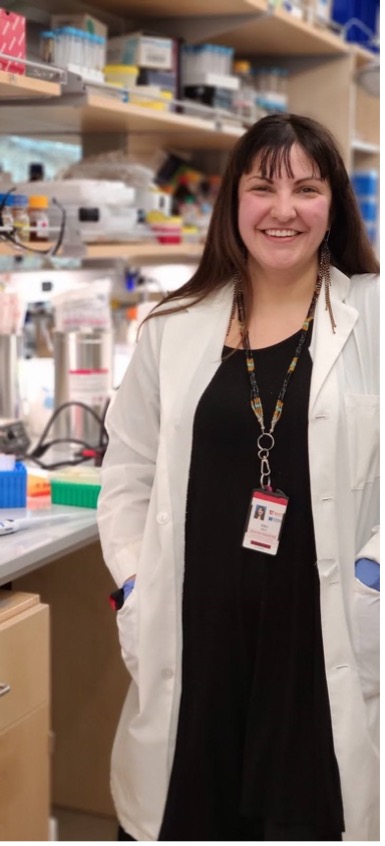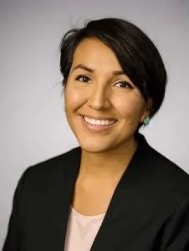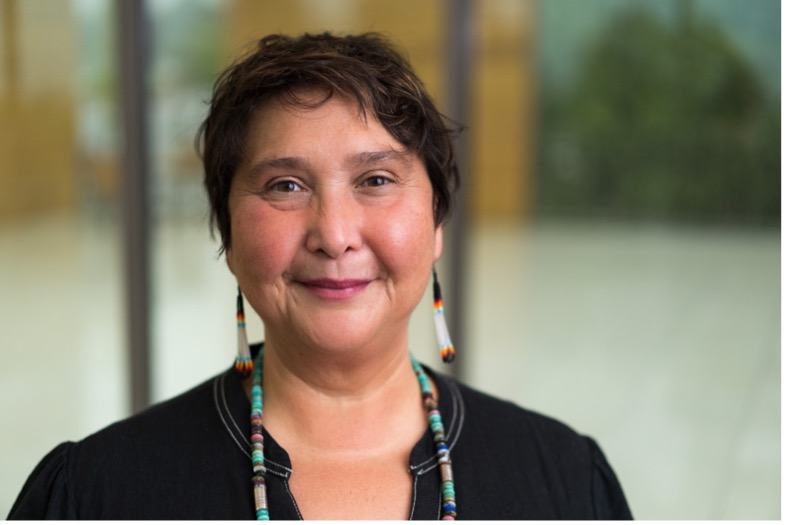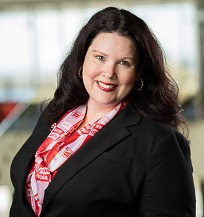As we conclude the celebration of Native American Heritage Month, let us take a moment to recognize some of our outstanding Native community who contribute to the University of Utah in various ways. Through their work, they have provided mentorship to students formally and informally. Through their exceptional experiences and expertise, they continue to contribute to campus and community transformation. This is certainly not an exhaustive list, but some of these University of Utah community members are highlighted here.
 Cynthia Benally (Diné/Navajo) is an assistant professor in the Department of Education, Culture and Society. She earned an MA degree in multicultural/bilingual education and EdD in educational leadership and supervision. Dr. Benally is a National Board Certified teacher with a Middle Childhood Generalist. With over 20 years of experience in public education in urban and Indigenous areas, she has worked with students from kindergarten through collegiate levels. Her program of research on the integration of Native American content into mainstream education focuses on the intent and praxis of Native American instruction mandates and the inclusion of Native perspectives and voices. She currently advises with the Arizona Department of Education on including culturally inclusive practices and guidelines in all public schools in Arizona. She is published in the Journal of American Indian Education and will have a chapter in the forthcoming edited book, Anthropology of Educational Policy.
Cynthia Benally (Diné/Navajo) is an assistant professor in the Department of Education, Culture and Society. She earned an MA degree in multicultural/bilingual education and EdD in educational leadership and supervision. Dr. Benally is a National Board Certified teacher with a Middle Childhood Generalist. With over 20 years of experience in public education in urban and Indigenous areas, she has worked with students from kindergarten through collegiate levels. Her program of research on the integration of Native American content into mainstream education focuses on the intent and praxis of Native American instruction mandates and the inclusion of Native perspectives and voices. She currently advises with the Arizona Department of Education on including culturally inclusive practices and guidelines in all public schools in Arizona. She is published in the Journal of American Indian Education and will have a chapter in the forthcoming edited book, Anthropology of Educational Policy.
 Faith Bowman is a proud Indigenous scholar and McNair alum from Wisconsin. She joined the Biosciences Ph.D. Program in Fall 2018. In the Schlegel lab, Bowman investigates the role of MCT7 in ketone body metabolism and the role Foxn3 in glucose utilization during fasting. Outside of research, Bowman likes to explore new restaurants and trails with friends, as well as connect with the surrounding Indigenous communities.
Faith Bowman is a proud Indigenous scholar and McNair alum from Wisconsin. She joined the Biosciences Ph.D. Program in Fall 2018. In the Schlegel lab, Bowman investigates the role of MCT7 in ketone body metabolism and the role Foxn3 in glucose utilization during fasting. Outside of research, Bowman likes to explore new restaurants and trails with friends, as well as connect with the surrounding Indigenous communities.
 Krystal Charley is originally from Dinétah (“Among the Diné”) in northern Arizona. She earned her B.S. degree in Biology from the University of New Mexico and then joined the Biosciences Ph.D. Program at the University of Utah in fall 2018. In the Williams Lab, she currently studies TCR-dependent differences in IL-2 driven T cell differentiation during infection. Outside of lab, Charley enjoys video games, traveling, hiking, CrossFit, family time and hanging out with friends. Last but not least, she enjoys trying out french fries from multiple places in search of deliciousness.
Krystal Charley is originally from Dinétah (“Among the Diné”) in northern Arizona. She earned her B.S. degree in Biology from the University of New Mexico and then joined the Biosciences Ph.D. Program at the University of Utah in fall 2018. In the Williams Lab, she currently studies TCR-dependent differences in IL-2 driven T cell differentiation during infection. Outside of lab, Charley enjoys video games, traveling, hiking, CrossFit, family time and hanging out with friends. Last but not least, she enjoys trying out french fries from multiple places in search of deliciousness.
 Ashley Cordes (Coquille) is an assistant professor of Indigenous communication at the University of Utah. Her research lies at the intersection of Indigenous studies, digital media and critical/cultural studies. Her research in these areas has been published in journals such as Cultural Studies ↔ Critical Methodologies, Journal of International and Intercultural Communication and Feminist Media Studies. She serves as chair of the Culture and Education Committee of the Coquille Nation. This year, she was selected for the American Council of Learned Societies Fellowship.
Ashley Cordes (Coquille) is an assistant professor of Indigenous communication at the University of Utah. Her research lies at the intersection of Indigenous studies, digital media and critical/cultural studies. Her research in these areas has been published in journals such as Cultural Studies ↔ Critical Methodologies, Journal of International and Intercultural Communication and Feminist Media Studies. She serves as chair of the Culture and Education Committee of the Coquille Nation. This year, she was selected for the American Council of Learned Societies Fellowship.
 Kali Dale is a member of the Anishinaabe Nation (White Earth Band of Ojibwe Indians). She is currently a Ph.D. Candidate in Oncological Sciences. The American Indian Science and Engineering Society (AISES) recognized her as the 2021 National Conference Graduate Student Presentation Winner. She serves as the president of the AISES, U Chapter at the U. Dale’s work focuses on evidence-based approaches for the treatment of lung cancer, specifically the molecular mechanisms that signal specific genetic mutations in the pathway of lung cancer development.
Kali Dale is a member of the Anishinaabe Nation (White Earth Band of Ojibwe Indians). She is currently a Ph.D. Candidate in Oncological Sciences. The American Indian Science and Engineering Society (AISES) recognized her as the 2021 National Conference Graduate Student Presentation Winner. She serves as the president of the AISES, U Chapter at the U. Dale’s work focuses on evidence-based approaches for the treatment of lung cancer, specifically the molecular mechanisms that signal specific genetic mutations in the pathway of lung cancer development.
 Donna Eldgridge is a member of the Navajo Nation and grew up on the Navajo reservation in Shiprock, New Mexico. In 2012, she earned a Bachelors's Degree in Social Work from the University of Utah. In 2013, she received her Master's Degree in Social Work from the University of Utah. Eldridge is interested in championing social justice issues and advocating for underrepresented populations. As the associate director in the Office of Health Equity, Diversity, and Inclusion, she works on educational outreach for K-12 students. Her programs are designed to stimulate student learning, create an interest in science, and expose students to medicine and related fields to ultimately create a gateway to higher education.
Donna Eldgridge is a member of the Navajo Nation and grew up on the Navajo reservation in Shiprock, New Mexico. In 2012, she earned a Bachelors's Degree in Social Work from the University of Utah. In 2013, she received her Master's Degree in Social Work from the University of Utah. Eldridge is interested in championing social justice issues and advocating for underrepresented populations. As the associate director in the Office of Health Equity, Diversity, and Inclusion, she works on educational outreach for K-12 students. Her programs are designed to stimulate student learning, create an interest in science, and expose students to medicine and related fields to ultimately create a gateway to higher education.
 Samantha Eldridge is a proud Diné. She currently serves on the Salt Lake City Commission on Racial Equity in Policing. She is a former member of the board of directors for Racially Just Utah and the National Indian Education Association. Eldridge is a past recipient of the University of Utah Equity and Diversity Award, presented on the basis of excellence in fostering leadership and continuing commitment to enhance diversity. In student affairs, she works to contribute to work that increases representation and awareness of underrepresented students and staff. She has led the planning and execution of the Indigenous Peoples Day Gallery Stroll that provides contemporary representations of American Indian people in the United States.
Samantha Eldridge is a proud Diné. She currently serves on the Salt Lake City Commission on Racial Equity in Policing. She is a former member of the board of directors for Racially Just Utah and the National Indian Education Association. Eldridge is a past recipient of the University of Utah Equity and Diversity Award, presented on the basis of excellence in fostering leadership and continuing commitment to enhance diversity. In student affairs, she works to contribute to work that increases representation and awareness of underrepresented students and staff. She has led the planning and execution of the Indigenous Peoples Day Gallery Stroll that provides contemporary representations of American Indian people in the United States.
 Kari James is a member of the Navajo Nation from Navajo Mountain, UT. She is passionate about advocating for Indigenous students and is responsible for starting a National Native American Law Student Association (NNALSA) chapter at the U. James is described as a rising scholar with a strong desire to fight for justice and improve life in Indian Country. She helped plan the Federal Bar Association’s October 2021 Conference. In addition to this and her work with the American Indian Law Center, she is creating a database of job placements in Indian Country and creating a database of current and former Native judicial clerks so they can serve as mentors to Native law students interested in applying for a judicial clerkship.
Kari James is a member of the Navajo Nation from Navajo Mountain, UT. She is passionate about advocating for Indigenous students and is responsible for starting a National Native American Law Student Association (NNALSA) chapter at the U. James is described as a rising scholar with a strong desire to fight for justice and improve life in Indian Country. She helped plan the Federal Bar Association’s October 2021 Conference. In addition to this and her work with the American Indian Law Center, she is creating a database of job placements in Indian Country and creating a database of current and former Native judicial clerks so they can serve as mentors to Native law students interested in applying for a judicial clerkship.
 Phyllis Pettit Nassi is enrolled in the Otoe-Missouri Tribe and is a member of the Cherokee Nation. She works in prevention and outreach as the associate director for research and science, special populations and Native American outreach at Huntsman Cancer Institute (HCI). As a cancer advocate for underserved communities, Nassi uses outreach to raise awareness of cancer, cancer research and clinical trials. She develops and implements policies, programs and financial objectives and assists in bringing projects to rural and frontier communities and their members.
Phyllis Pettit Nassi is enrolled in the Otoe-Missouri Tribe and is a member of the Cherokee Nation. She works in prevention and outreach as the associate director for research and science, special populations and Native American outreach at Huntsman Cancer Institute (HCI). As a cancer advocate for underserved communities, Nassi uses outreach to raise awareness of cancer, cancer research and clinical trials. She develops and implements policies, programs and financial objectives and assists in bringing projects to rural and frontier communities and their members.
 Dena Ned is a citizen of the Chickasaw Nation of Oklahoma. She serves as the inaugural associate dean of the Office for First Generation Access. She is also an associate professor at the University of Utah College of Social Work. Her research has focused on the Indian Child Welfare Act, Title V of the Indian Health Care Improvement Act, urban American-Indian health policies and delivery of care systems as well as social determinants of health in Native communities. After earning her Masters of Social Welfare (MSW) from the University of California, Berkeley, she worked with California’s Division of Children and Family Services before going on to direct a Title V-funded urban Indian health center in Salt Lake City. Her direct practice experience motivated her to explore issues of social justice, health and policy from the perspective of urban Indians.
Dena Ned is a citizen of the Chickasaw Nation of Oklahoma. She serves as the inaugural associate dean of the Office for First Generation Access. She is also an associate professor at the University of Utah College of Social Work. Her research has focused on the Indian Child Welfare Act, Title V of the Indian Health Care Improvement Act, urban American-Indian health policies and delivery of care systems as well as social determinants of health in Native communities. After earning her Masters of Social Welfare (MSW) from the University of California, Berkeley, she worked with California’s Division of Children and Family Services before going on to direct a Title V-funded urban Indian health center in Salt Lake City. Her direct practice experience motivated her to explore issues of social justice, health and policy from the perspective of urban Indians.
 Charles Sepulveda (Tongva and Acjachemen) is an assistant professor in Ethnic Studies. He is currently working on his first book project tentatively titled, Indigenous Nations v. Junípero Serra: Resisting the Spanish Imaginary, which analyzes the development of what he has named the Spanish Imaginary, a play on Emma Perez’s “colonial imaginary”—the historiography produced through the traditional discipline of history silencing and ignoring people of color, women and sexuality. In his recent publication, Our Sacred Waters: Theorizing Kuuyam as a Decolonial Possibility, Sepulveda analyzes the desecration of the Santa Ana River in southern California and critically traces the logics of domestication that impact both Native peoples and our environments.
Charles Sepulveda (Tongva and Acjachemen) is an assistant professor in Ethnic Studies. He is currently working on his first book project tentatively titled, Indigenous Nations v. Junípero Serra: Resisting the Spanish Imaginary, which analyzes the development of what he has named the Spanish Imaginary, a play on Emma Perez’s “colonial imaginary”—the historiography produced through the traditional discipline of history silencing and ignoring people of color, women and sexuality. In his recent publication, Our Sacred Waters: Theorizing Kuuyam as a Decolonial Possibility, Sepulveda analyzes the desecration of the Santa Ana River in southern California and critically traces the logics of domestication that impact both Native peoples and our environments.
 Alexander Skibine is an Osage Indian Nation of Oklahoma (OIN) citizen. He received a B.A. in political science and French literature from Tufts University and a J.D. from Northwestern University School of Law. Before joining the faculty at the University of Utah S.J. Quinney College of Law in 1989, Skibine served as Deputy Counsel for Indian Affairs for the U.S. House of Representatives Committee on Interior and Insular Affairs. Skibine has published many articles in the area of federal Indian law and he is frequently invited to speak on federal Indian law issues at venues around the country. He is a member of the District of Columbia bar association and teaches administrative law, constitutional law, torts and federal Indian law.
Alexander Skibine is an Osage Indian Nation of Oklahoma (OIN) citizen. He received a B.A. in political science and French literature from Tufts University and a J.D. from Northwestern University School of Law. Before joining the faculty at the University of Utah S.J. Quinney College of Law in 1989, Skibine served as Deputy Counsel for Indian Affairs for the U.S. House of Representatives Committee on Interior and Insular Affairs. Skibine has published many articles in the area of federal Indian law and he is frequently invited to speak on federal Indian law issues at venues around the country. He is a member of the District of Columbia bar association and teaches administrative law, constitutional law, torts and federal Indian law.
 Thomas Swensen is an assistant professor of Ethnic Studies at the University of Utah and was the 2017-2018 Katrin H. Lamon fellowship residential scholar at the School for Advanced Research in Santa Fe, New Mexico. Born and raised in the Kodiak Archipelago and an original shareholder in the Alaska Native Claims Settlement corporations Koniag, Inc., and Leisnoi, Inc., Swensen is enrolled in the federally recognized Tangirnaq native village—also known as the Woody Island tribe—and serves the Alutiiq on the board of directors of the Koniag education foundation, an organization that promotes the educational goals and economy of the Koniag Alutiiq and their descendants. Swensen’s study focuses on Native American and Western Hemispheric history, law, art and literature and has interest in punk and urban studies.
Thomas Swensen is an assistant professor of Ethnic Studies at the University of Utah and was the 2017-2018 Katrin H. Lamon fellowship residential scholar at the School for Advanced Research in Santa Fe, New Mexico. Born and raised in the Kodiak Archipelago and an original shareholder in the Alaska Native Claims Settlement corporations Koniag, Inc., and Leisnoi, Inc., Swensen is enrolled in the federally recognized Tangirnaq native village—also known as the Woody Island tribe—and serves the Alutiiq on the board of directors of the Koniag education foundation, an organization that promotes the educational goals and economy of the Koniag Alutiiq and their descendants. Swensen’s study focuses on Native American and Western Hemispheric history, law, art and literature and has interest in punk and urban studies.
 Heather Tanana, JD, MPH (Diné) is an assistant professor (Research) & Wallace Stegner Center Fellow at the S.J. Quinney College of Law. In recognition of her work related to Tribal communities and the pandemic, Tanana was awarded 2020 Attorney of the Year from the Energy, Natural Resources & Environmental Law Section and the Jimi Mitsunaga Excellence in the Law Award from the Utah Minority Bar Association. Tanana’s research interests include exploring the overlay between environmental and health policy, promoting better practices in Indian child welfare and criminal justice in Indian Country. She chairs the Indian Child Welfare Act Committee of the Indian Law Section. She is also part of the Rocky Mountain Mineral Law Foundation Diversity and Inclusion Task Force and serves as chair on the Board of Directors of the Urban Indian Center of Salt Lake.
Heather Tanana, JD, MPH (Diné) is an assistant professor (Research) & Wallace Stegner Center Fellow at the S.J. Quinney College of Law. In recognition of her work related to Tribal communities and the pandemic, Tanana was awarded 2020 Attorney of the Year from the Energy, Natural Resources & Environmental Law Section and the Jimi Mitsunaga Excellence in the Law Award from the Utah Minority Bar Association. Tanana’s research interests include exploring the overlay between environmental and health policy, promoting better practices in Indian child welfare and criminal justice in Indian Country. She chairs the Indian Child Welfare Act Committee of the Indian Law Section. She is also part of the Rocky Mountain Mineral Law Foundation Diversity and Inclusion Task Force and serves as chair on the Board of Directors of the Urban Indian Center of Salt Lake.
 Franci Taylor is a member of the Choctaw tribe and serves as the director of the University of Utah’s American Indian Resource Center. She has been at the U since 2014 and has over 25 years of experience in American Indian education. Taylor has worked on creating American Indian curriculum for public schools. She directed two award-winning college preparation bridging programs for American Indian youth and has developed effective, best practices, recruitment and retention programs at the junior high school, high school and university levels. Taylor came to the University of Utah from Washington State University (WSU) where she was the Native American retention specialist and director for the American Indian Student Center.
Franci Taylor is a member of the Choctaw tribe and serves as the director of the University of Utah’s American Indian Resource Center. She has been at the U since 2014 and has over 25 years of experience in American Indian education. Taylor has worked on creating American Indian curriculum for public schools. She directed two award-winning college preparation bridging programs for American Indian youth and has developed effective, best practices, recruitment and retention programs at the junior high school, high school and university levels. Taylor came to the University of Utah from Washington State University (WSU) where she was the Native American retention specialist and director for the American Indian Student Center.
 Elizabeth Kronk Warner is dean and professor of law at the S.J. Quinney College of Law at the University of Utah. She was formerly associate dean and professor of law at the University of Kansas School of Law (KU), where she was also the director of the Tribal Law and Government Center. Kronk Warner is a nationally recognized expert in the intersection of Environmental and Indian law. She has taught courses in property, Indian, environmental and natural resources aw, and supervised the KU Tribal Judicial Support Clinic. She has received several teaching excellence awards, co-authored several books on environmental issues and Native Americans, and has over 40 articles and book chapters to her credit. Kronk Warner, a citizen of the Sault Ste. Marie Tribe of Chippewa Indians, served as an appellate judge for the tribe and as a district judge for the Prairie Band Potawatomi Tribe.
Elizabeth Kronk Warner is dean and professor of law at the S.J. Quinney College of Law at the University of Utah. She was formerly associate dean and professor of law at the University of Kansas School of Law (KU), where she was also the director of the Tribal Law and Government Center. Kronk Warner is a nationally recognized expert in the intersection of Environmental and Indian law. She has taught courses in property, Indian, environmental and natural resources aw, and supervised the KU Tribal Judicial Support Clinic. She has received several teaching excellence awards, co-authored several books on environmental issues and Native Americans, and has over 40 articles and book chapters to her credit. Kronk Warner, a citizen of the Sault Ste. Marie Tribe of Chippewa Indians, served as an appellate judge for the tribe and as a district judge for the Prairie Band Potawatomi Tribe.
